Total Quality Management in Event Planning
VerifiedAdded on 2020/04/21
|15
|3138
|38
AI Summary
This assignment explores the implementation of Total Quality Management (TQM) within the context of event planning. It analyzes how TQM principles can enhance service quality, customer satisfaction, and overall event success. The document draws upon relevant literature and real-world examples from event companies like The Events Company in Birmingham to illustrate its points. The assignment delves into concepts like the total product concept, service quality monitoring, and the role of employee training in delivering high-quality events.
Contribute Materials
Your contribution can guide someone’s learning journey. Share your
documents today.
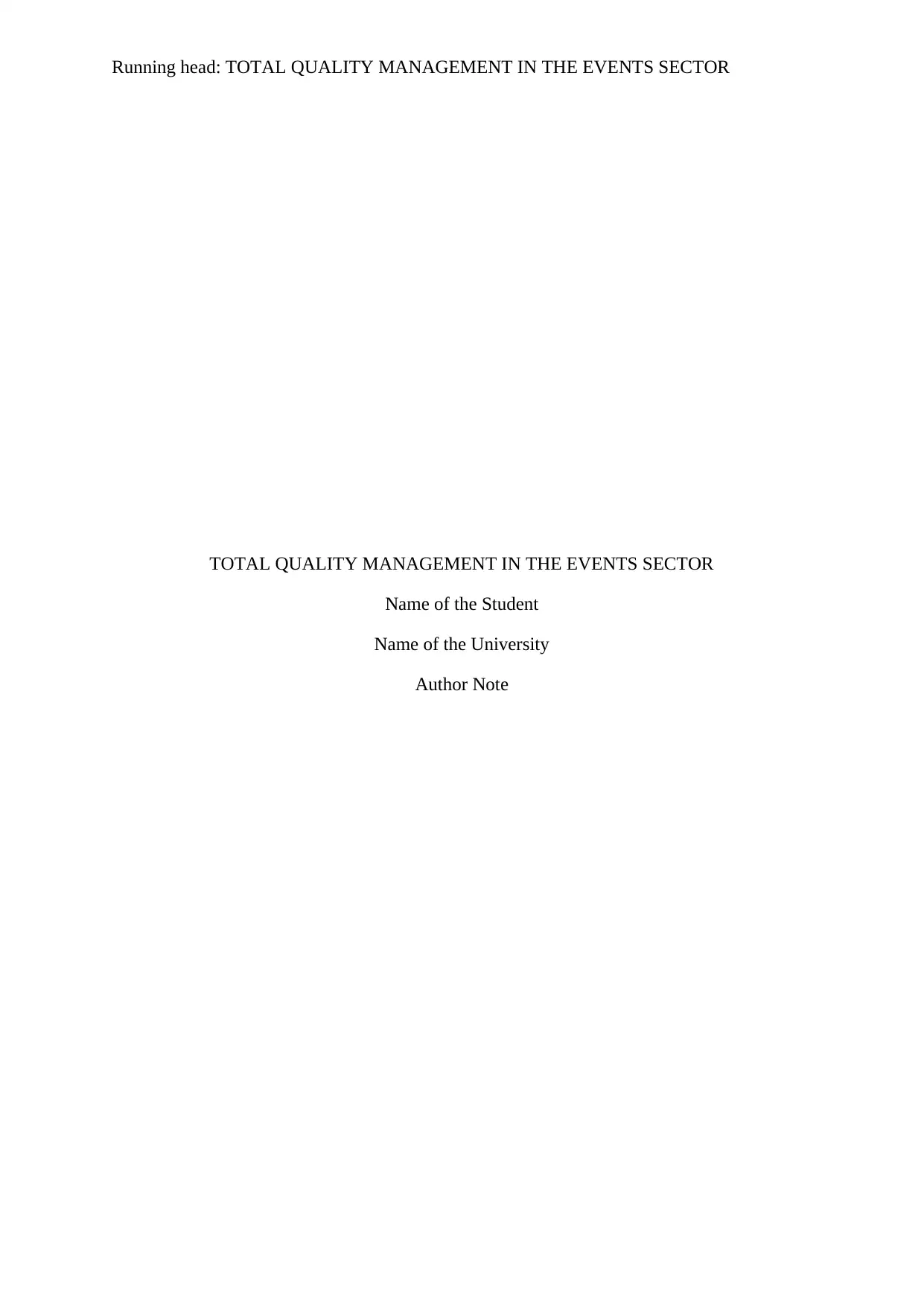
Running head: TOTAL QUALITY MANAGEMENT IN THE EVENTS SECTOR
TOTAL QUALITY MANAGEMENT IN THE EVENTS SECTOR
Name of the Student
Name of the University
Author Note
TOTAL QUALITY MANAGEMENT IN THE EVENTS SECTOR
Name of the Student
Name of the University
Author Note
Secure Best Marks with AI Grader
Need help grading? Try our AI Grader for instant feedback on your assignments.
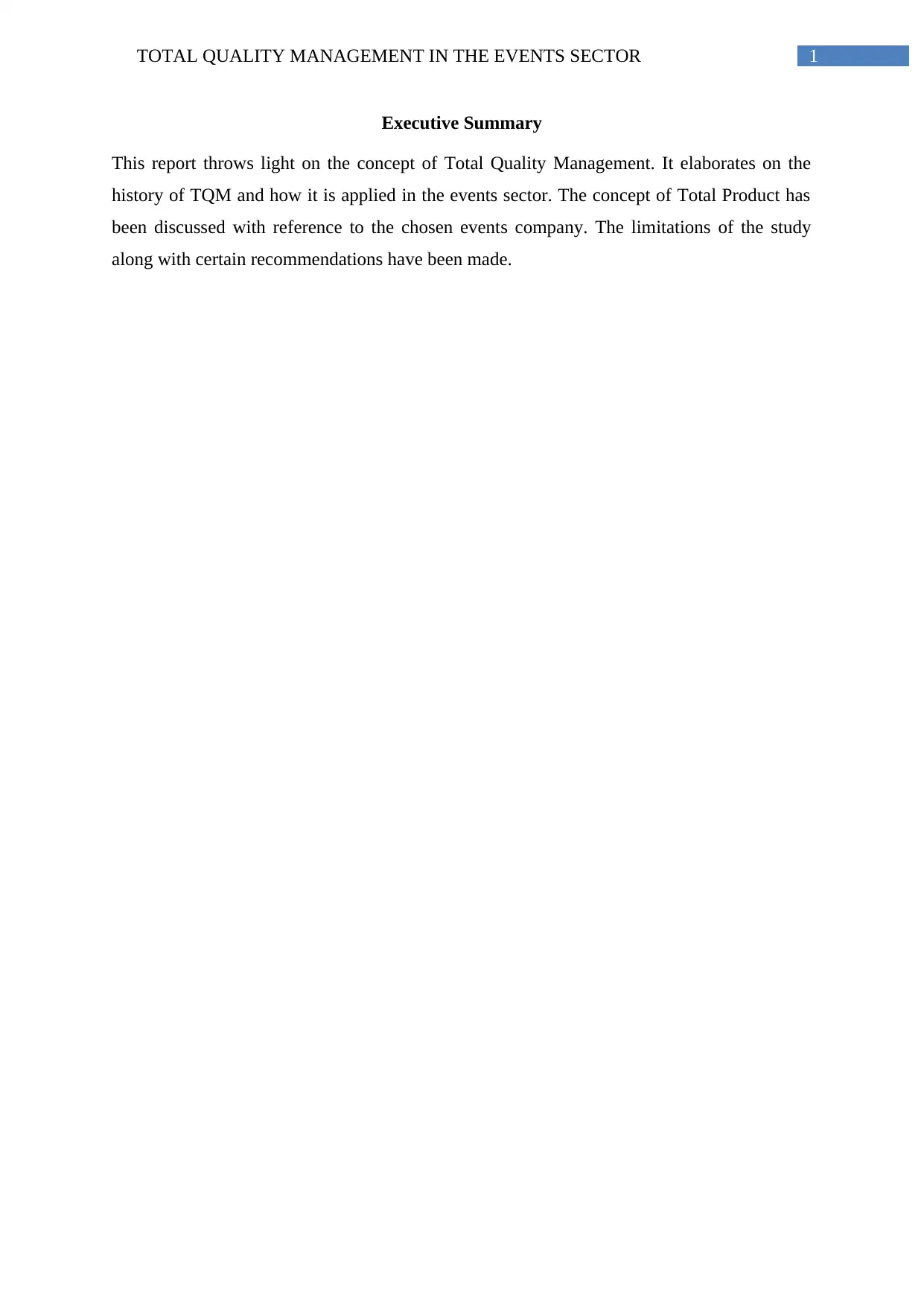
1TOTAL QUALITY MANAGEMENT IN THE EVENTS SECTOR
Executive Summary
This report throws light on the concept of Total Quality Management. It elaborates on the
history of TQM and how it is applied in the events sector. The concept of Total Product has
been discussed with reference to the chosen events company. The limitations of the study
along with certain recommendations have been made.
Executive Summary
This report throws light on the concept of Total Quality Management. It elaborates on the
history of TQM and how it is applied in the events sector. The concept of Total Product has
been discussed with reference to the chosen events company. The limitations of the study
along with certain recommendations have been made.
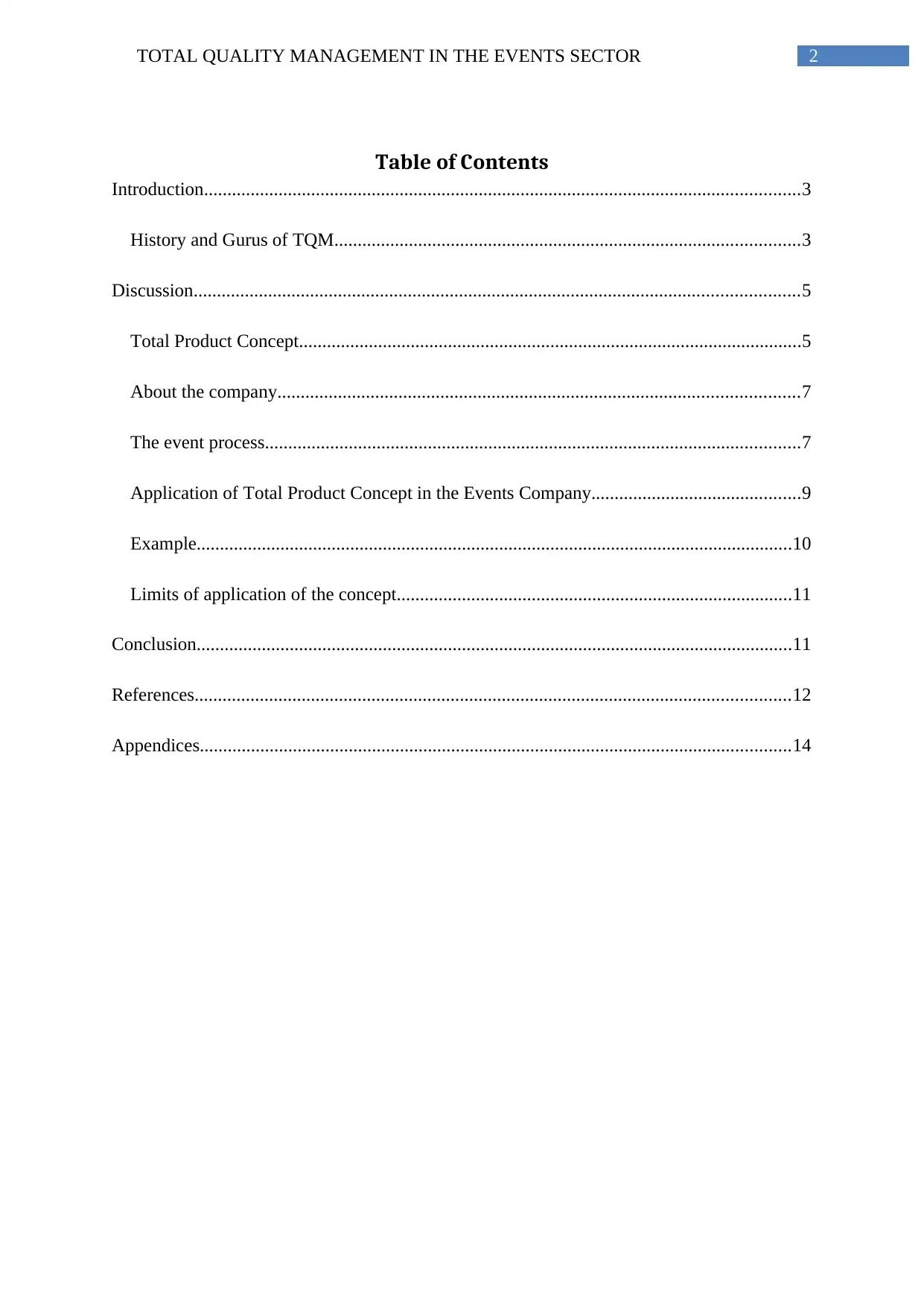
2TOTAL QUALITY MANAGEMENT IN THE EVENTS SECTOR
Table of Contents
Introduction................................................................................................................................3
History and Gurus of TQM....................................................................................................3
Discussion..................................................................................................................................5
Total Product Concept............................................................................................................5
About the company................................................................................................................7
The event process...................................................................................................................7
Application of Total Product Concept in the Events Company.............................................9
Example................................................................................................................................10
Limits of application of the concept.....................................................................................11
Conclusion................................................................................................................................11
References................................................................................................................................12
Appendices...............................................................................................................................14
Table of Contents
Introduction................................................................................................................................3
History and Gurus of TQM....................................................................................................3
Discussion..................................................................................................................................5
Total Product Concept............................................................................................................5
About the company................................................................................................................7
The event process...................................................................................................................7
Application of Total Product Concept in the Events Company.............................................9
Example................................................................................................................................10
Limits of application of the concept.....................................................................................11
Conclusion................................................................................................................................11
References................................................................................................................................12
Appendices...............................................................................................................................14
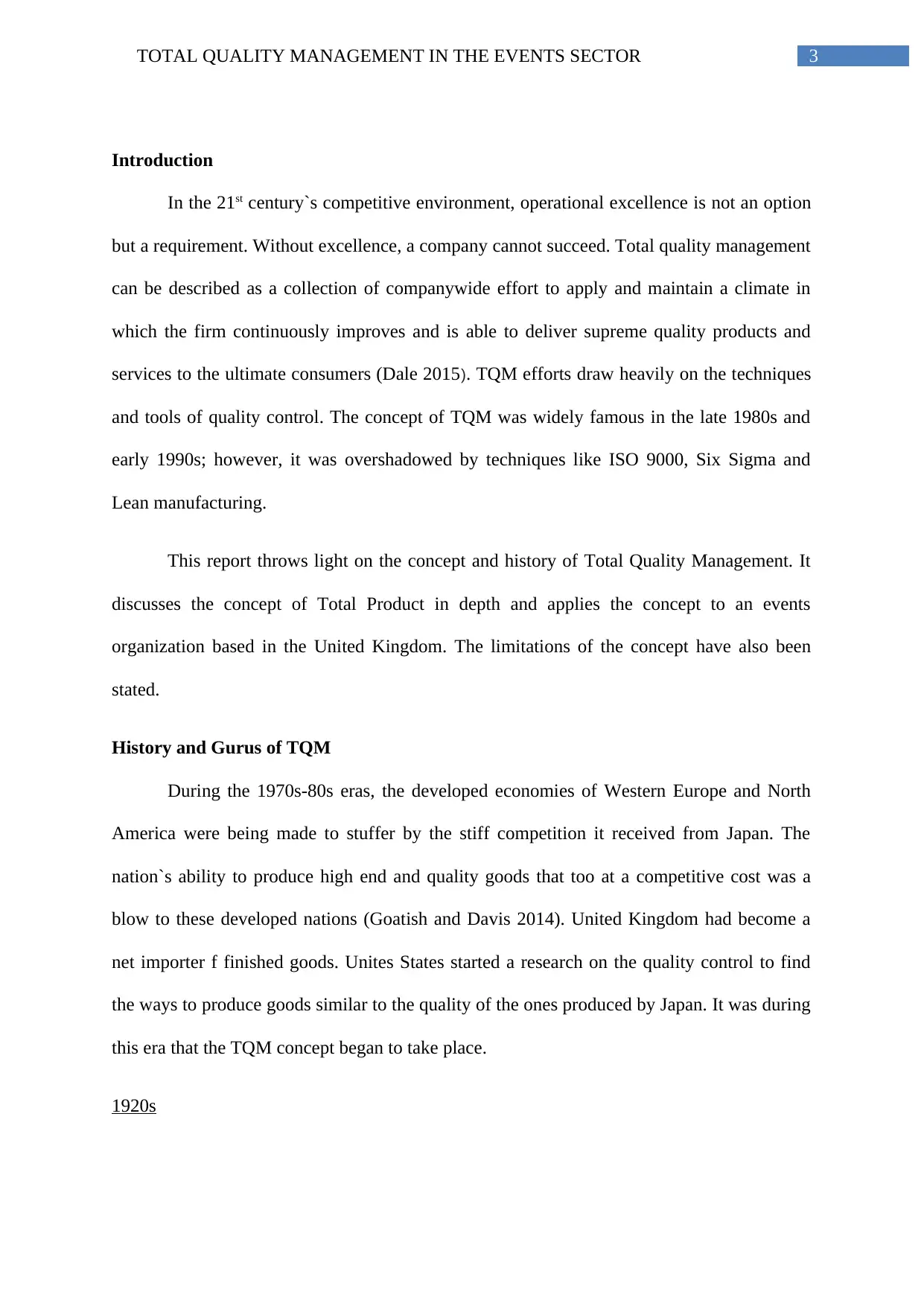
3TOTAL QUALITY MANAGEMENT IN THE EVENTS SECTOR
Introduction
In the 21st century`s competitive environment, operational excellence is not an option
but a requirement. Without excellence, a company cannot succeed. Total quality management
can be described as a collection of companywide effort to apply and maintain a climate in
which the firm continuously improves and is able to deliver supreme quality products and
services to the ultimate consumers (Dale 2015). TQM efforts draw heavily on the techniques
and tools of quality control. The concept of TQM was widely famous in the late 1980s and
early 1990s; however, it was overshadowed by techniques like ISO 9000, Six Sigma and
Lean manufacturing.
This report throws light on the concept and history of Total Quality Management. It
discusses the concept of Total Product in depth and applies the concept to an events
organization based in the United Kingdom. The limitations of the concept have also been
stated.
History and Gurus of TQM
During the 1970s-80s eras, the developed economies of Western Europe and North
America were being made to stuffer by the stiff competition it received from Japan. The
nation`s ability to produce high end and quality goods that too at a competitive cost was a
blow to these developed nations (Goatish and Davis 2014). United Kingdom had become a
net importer f finished goods. Unites States started a research on the quality control to find
the ways to produce goods similar to the quality of the ones produced by Japan. It was during
this era that the TQM concept began to take place.
1920s
Introduction
In the 21st century`s competitive environment, operational excellence is not an option
but a requirement. Without excellence, a company cannot succeed. Total quality management
can be described as a collection of companywide effort to apply and maintain a climate in
which the firm continuously improves and is able to deliver supreme quality products and
services to the ultimate consumers (Dale 2015). TQM efforts draw heavily on the techniques
and tools of quality control. The concept of TQM was widely famous in the late 1980s and
early 1990s; however, it was overshadowed by techniques like ISO 9000, Six Sigma and
Lean manufacturing.
This report throws light on the concept and history of Total Quality Management. It
discusses the concept of Total Product in depth and applies the concept to an events
organization based in the United Kingdom. The limitations of the concept have also been
stated.
History and Gurus of TQM
During the 1970s-80s eras, the developed economies of Western Europe and North
America were being made to stuffer by the stiff competition it received from Japan. The
nation`s ability to produce high end and quality goods that too at a competitive cost was a
blow to these developed nations (Goatish and Davis 2014). United Kingdom had become a
net importer f finished goods. Unites States started a research on the quality control to find
the ways to produce goods similar to the quality of the ones produced by Japan. It was during
this era that the TQM concept began to take place.
1920s
Secure Best Marks with AI Grader
Need help grading? Try our AI Grader for instant feedback on your assignments.
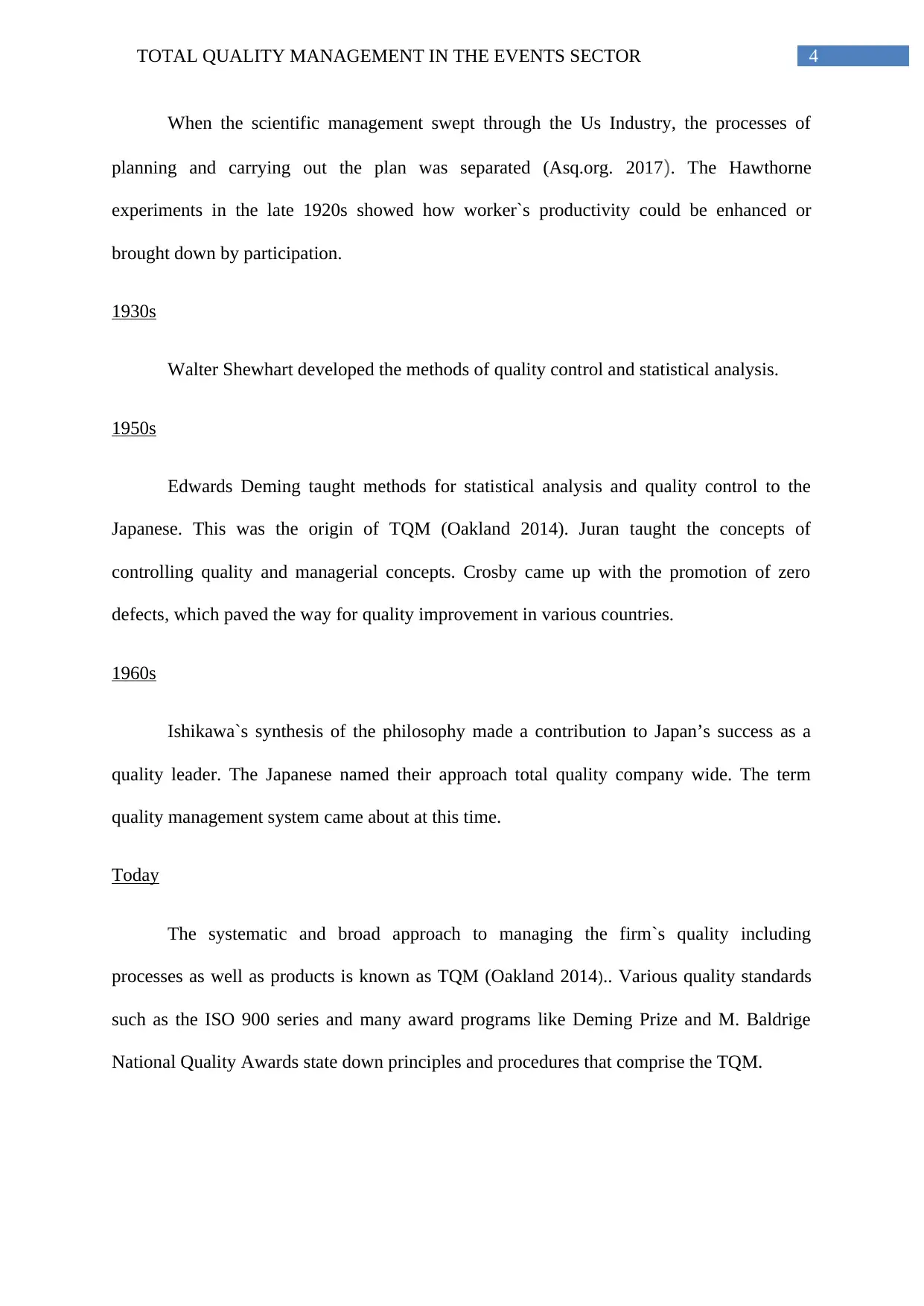
4TOTAL QUALITY MANAGEMENT IN THE EVENTS SECTOR
When the scientific management swept through the Us Industry, the processes of
planning and carrying out the plan was separated (Asq.org. 2017). The Hawthorne
experiments in the late 1920s showed how worker`s productivity could be enhanced or
brought down by participation.
1930s
Walter Shewhart developed the methods of quality control and statistical analysis.
1950s
Edwards Deming taught methods for statistical analysis and quality control to the
Japanese. This was the origin of TQM (Oakland 2014). Juran taught the concepts of
controlling quality and managerial concepts. Crosby came up with the promotion of zero
defects, which paved the way for quality improvement in various countries.
1960s
Ishikawa`s synthesis of the philosophy made a contribution to Japan’s success as a
quality leader. The Japanese named their approach total quality company wide. The term
quality management system came about at this time.
Today
The systematic and broad approach to managing the firm`s quality including
processes as well as products is known as TQM (Oakland 2014).. Various quality standards
such as the ISO 900 series and many award programs like Deming Prize and M. Baldrige
National Quality Awards state down principles and procedures that comprise the TQM.
When the scientific management swept through the Us Industry, the processes of
planning and carrying out the plan was separated (Asq.org. 2017). The Hawthorne
experiments in the late 1920s showed how worker`s productivity could be enhanced or
brought down by participation.
1930s
Walter Shewhart developed the methods of quality control and statistical analysis.
1950s
Edwards Deming taught methods for statistical analysis and quality control to the
Japanese. This was the origin of TQM (Oakland 2014). Juran taught the concepts of
controlling quality and managerial concepts. Crosby came up with the promotion of zero
defects, which paved the way for quality improvement in various countries.
1960s
Ishikawa`s synthesis of the philosophy made a contribution to Japan’s success as a
quality leader. The Japanese named their approach total quality company wide. The term
quality management system came about at this time.
Today
The systematic and broad approach to managing the firm`s quality including
processes as well as products is known as TQM (Oakland 2014).. Various quality standards
such as the ISO 900 series and many award programs like Deming Prize and M. Baldrige
National Quality Awards state down principles and procedures that comprise the TQM.
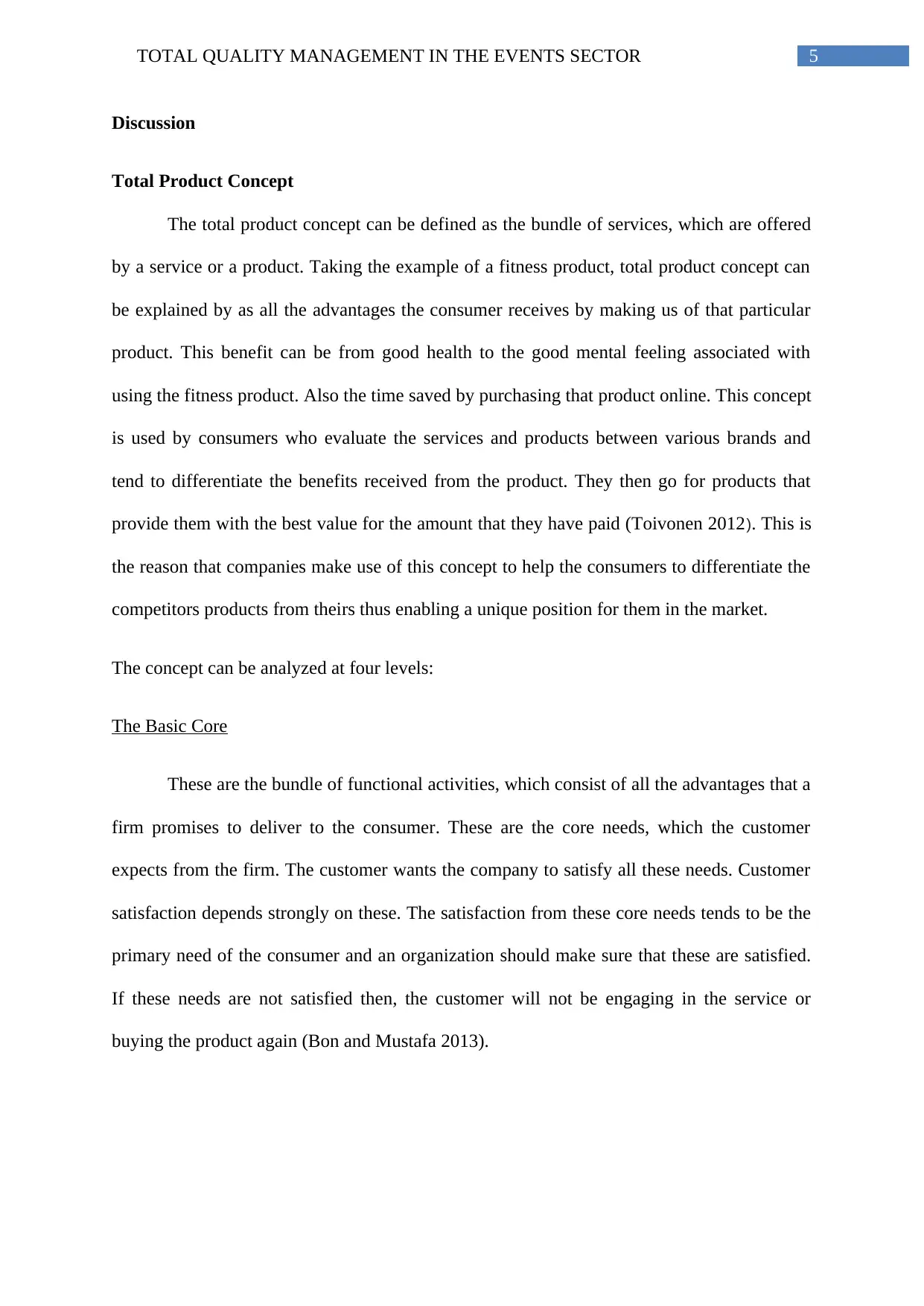
5TOTAL QUALITY MANAGEMENT IN THE EVENTS SECTOR
Discussion
Total Product Concept
The total product concept can be defined as the bundle of services, which are offered
by a service or a product. Taking the example of a fitness product, total product concept can
be explained by as all the advantages the consumer receives by making us of that particular
product. This benefit can be from good health to the good mental feeling associated with
using the fitness product. Also the time saved by purchasing that product online. This concept
is used by consumers who evaluate the services and products between various brands and
tend to differentiate the benefits received from the product. They then go for products that
provide them with the best value for the amount that they have paid (Toivonen 2012). This is
the reason that companies make use of this concept to help the consumers to differentiate the
competitors products from theirs thus enabling a unique position for them in the market.
The concept can be analyzed at four levels:
The Basic Core
These are the bundle of functional activities, which consist of all the advantages that a
firm promises to deliver to the consumer. These are the core needs, which the customer
expects from the firm. The customer wants the company to satisfy all these needs. Customer
satisfaction depends strongly on these. The satisfaction from these core needs tends to be the
primary need of the consumer and an organization should make sure that these are satisfied.
If these needs are not satisfied then, the customer will not be engaging in the service or
buying the product again (Bon and Mustafa 2013).
Discussion
Total Product Concept
The total product concept can be defined as the bundle of services, which are offered
by a service or a product. Taking the example of a fitness product, total product concept can
be explained by as all the advantages the consumer receives by making us of that particular
product. This benefit can be from good health to the good mental feeling associated with
using the fitness product. Also the time saved by purchasing that product online. This concept
is used by consumers who evaluate the services and products between various brands and
tend to differentiate the benefits received from the product. They then go for products that
provide them with the best value for the amount that they have paid (Toivonen 2012). This is
the reason that companies make use of this concept to help the consumers to differentiate the
competitors products from theirs thus enabling a unique position for them in the market.
The concept can be analyzed at four levels:
The Basic Core
These are the bundle of functional activities, which consist of all the advantages that a
firm promises to deliver to the consumer. These are the core needs, which the customer
expects from the firm. The customer wants the company to satisfy all these needs. Customer
satisfaction depends strongly on these. The satisfaction from these core needs tends to be the
primary need of the consumer and an organization should make sure that these are satisfied.
If these needs are not satisfied then, the customer will not be engaging in the service or
buying the product again (Bon and Mustafa 2013).
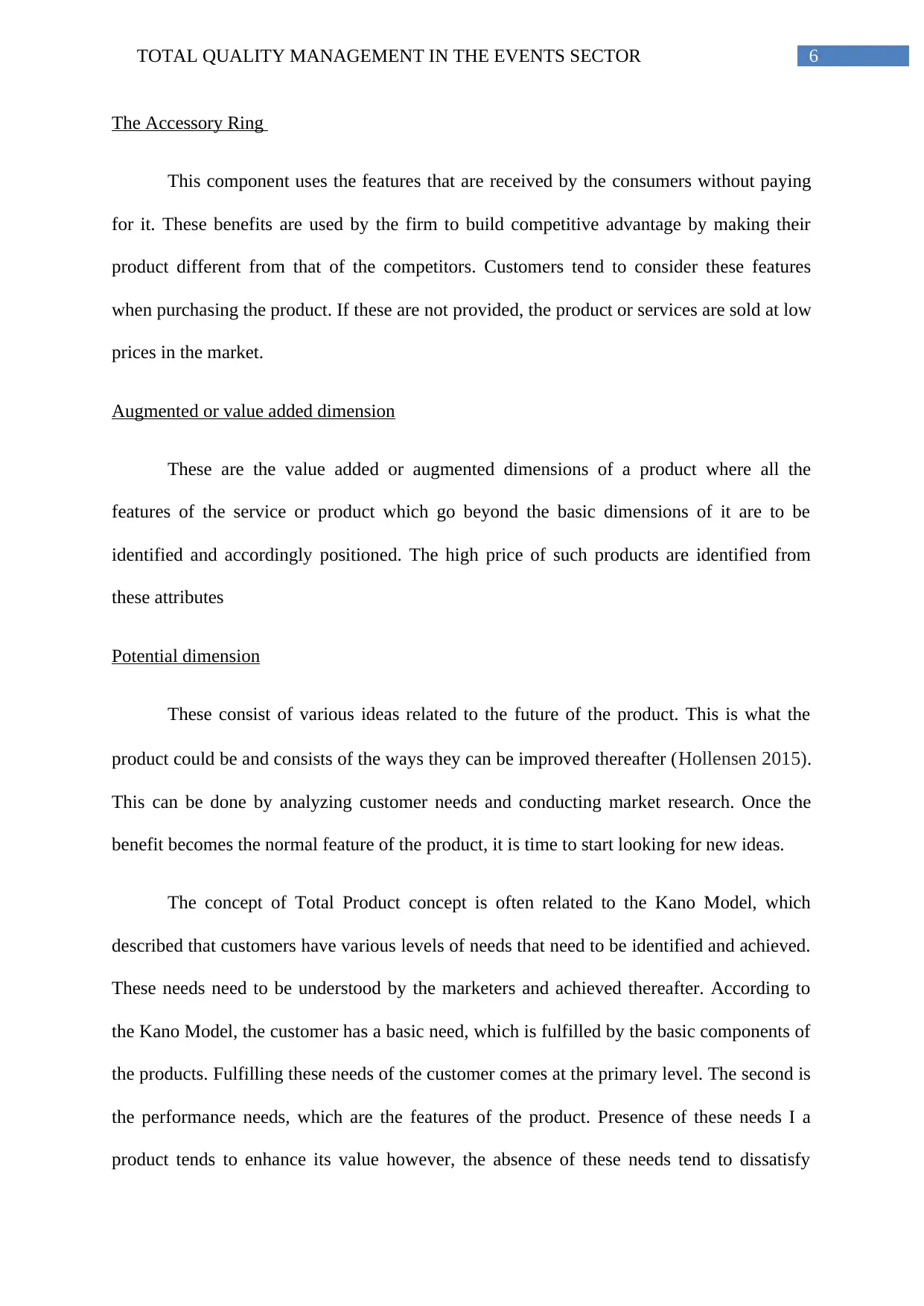
6TOTAL QUALITY MANAGEMENT IN THE EVENTS SECTOR
The Accessory Ring
This component uses the features that are received by the consumers without paying
for it. These benefits are used by the firm to build competitive advantage by making their
product different from that of the competitors. Customers tend to consider these features
when purchasing the product. If these are not provided, the product or services are sold at low
prices in the market.
Augmented or value added dimension
These are the value added or augmented dimensions of a product where all the
features of the service or product which go beyond the basic dimensions of it are to be
identified and accordingly positioned. The high price of such products are identified from
these attributes
Potential dimension
These consist of various ideas related to the future of the product. This is what the
product could be and consists of the ways they can be improved thereafter (Hollensen 2015).
This can be done by analyzing customer needs and conducting market research. Once the
benefit becomes the normal feature of the product, it is time to start looking for new ideas.
The concept of Total Product concept is often related to the Kano Model, which
described that customers have various levels of needs that need to be identified and achieved.
These needs need to be understood by the marketers and achieved thereafter. According to
the Kano Model, the customer has a basic need, which is fulfilled by the basic components of
the products. Fulfilling these needs of the customer comes at the primary level. The second is
the performance needs, which are the features of the product. Presence of these needs I a
product tends to enhance its value however, the absence of these needs tend to dissatisfy
The Accessory Ring
This component uses the features that are received by the consumers without paying
for it. These benefits are used by the firm to build competitive advantage by making their
product different from that of the competitors. Customers tend to consider these features
when purchasing the product. If these are not provided, the product or services are sold at low
prices in the market.
Augmented or value added dimension
These are the value added or augmented dimensions of a product where all the
features of the service or product which go beyond the basic dimensions of it are to be
identified and accordingly positioned. The high price of such products are identified from
these attributes
Potential dimension
These consist of various ideas related to the future of the product. This is what the
product could be and consists of the ways they can be improved thereafter (Hollensen 2015).
This can be done by analyzing customer needs and conducting market research. Once the
benefit becomes the normal feature of the product, it is time to start looking for new ideas.
The concept of Total Product concept is often related to the Kano Model, which
described that customers have various levels of needs that need to be identified and achieved.
These needs need to be understood by the marketers and achieved thereafter. According to
the Kano Model, the customer has a basic need, which is fulfilled by the basic components of
the products. Fulfilling these needs of the customer comes at the primary level. The second is
the performance needs, which are the features of the product. Presence of these needs I a
product tends to enhance its value however, the absence of these needs tend to dissatisfy
Paraphrase This Document
Need a fresh take? Get an instant paraphrase of this document with our AI Paraphraser
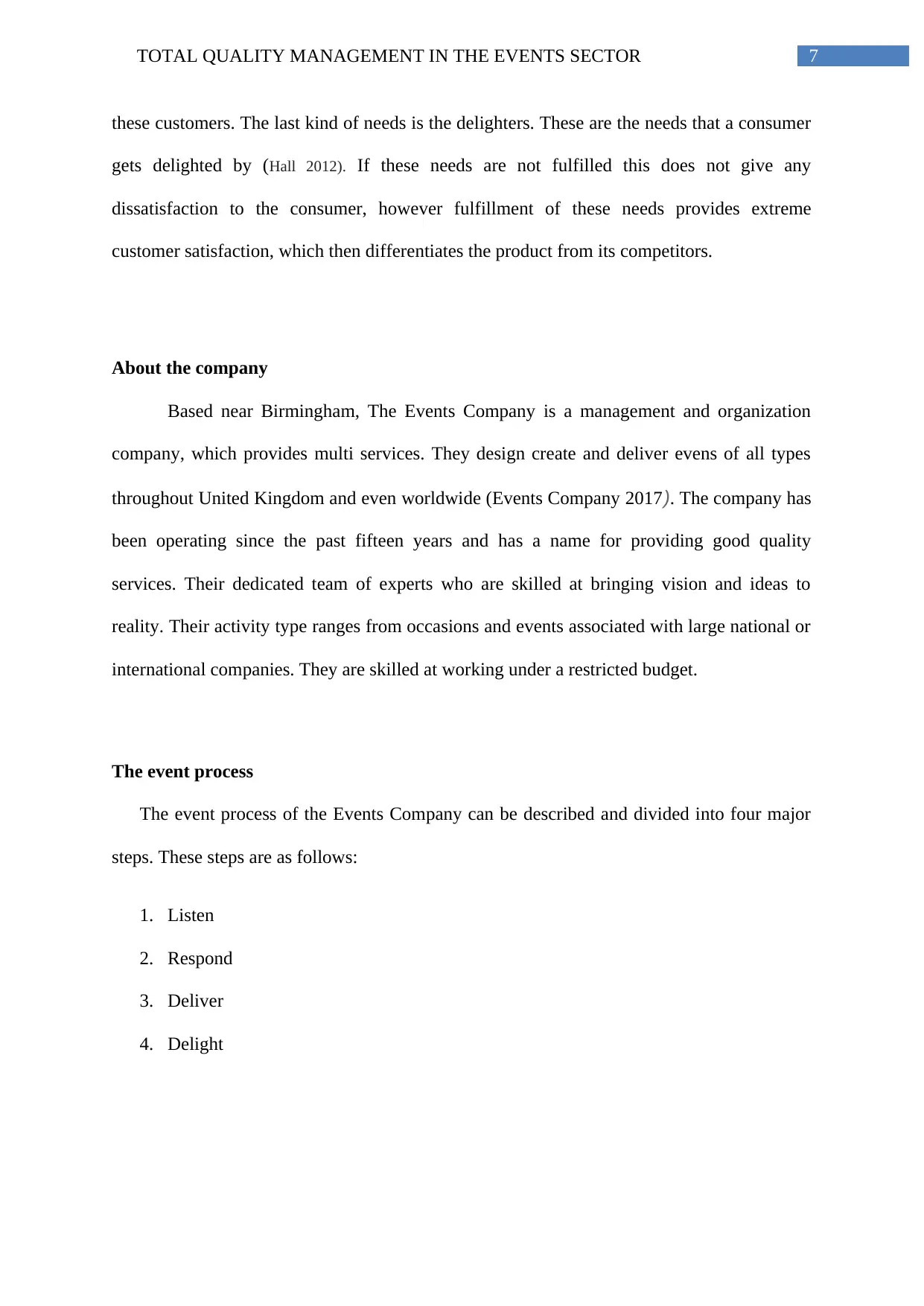
7TOTAL QUALITY MANAGEMENT IN THE EVENTS SECTOR
these customers. The last kind of needs is the delighters. These are the needs that a consumer
gets delighted by (Hall 2012). If these needs are not fulfilled this does not give any
dissatisfaction to the consumer, however fulfillment of these needs provides extreme
customer satisfaction, which then differentiates the product from its competitors.
About the company
Based near Birmingham, The Events Company is a management and organization
company, which provides multi services. They design create and deliver evens of all types
throughout United Kingdom and even worldwide (Events Company 2017). The company has
been operating since the past fifteen years and has a name for providing good quality
services. Their dedicated team of experts who are skilled at bringing vision and ideas to
reality. Their activity type ranges from occasions and events associated with large national or
international companies. They are skilled at working under a restricted budget.
The event process
The event process of the Events Company can be described and divided into four major
steps. These steps are as follows:
1. Listen
2. Respond
3. Deliver
4. Delight
these customers. The last kind of needs is the delighters. These are the needs that a consumer
gets delighted by (Hall 2012). If these needs are not fulfilled this does not give any
dissatisfaction to the consumer, however fulfillment of these needs provides extreme
customer satisfaction, which then differentiates the product from its competitors.
About the company
Based near Birmingham, The Events Company is a management and organization
company, which provides multi services. They design create and deliver evens of all types
throughout United Kingdom and even worldwide (Events Company 2017). The company has
been operating since the past fifteen years and has a name for providing good quality
services. Their dedicated team of experts who are skilled at bringing vision and ideas to
reality. Their activity type ranges from occasions and events associated with large national or
international companies. They are skilled at working under a restricted budget.
The event process
The event process of the Events Company can be described and divided into four major
steps. These steps are as follows:
1. Listen
2. Respond
3. Deliver
4. Delight
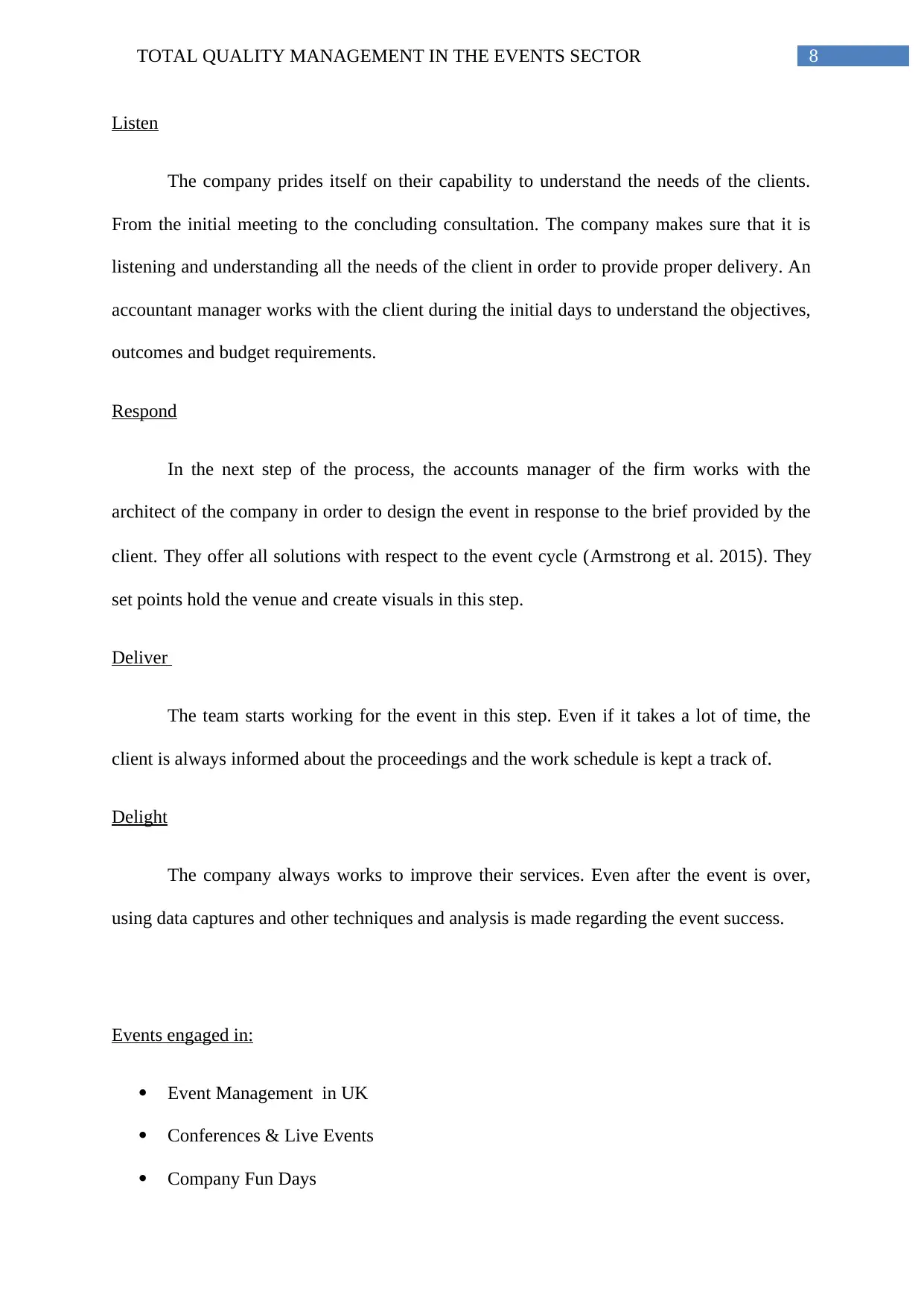
8TOTAL QUALITY MANAGEMENT IN THE EVENTS SECTOR
Listen
The company prides itself on their capability to understand the needs of the clients.
From the initial meeting to the concluding consultation. The company makes sure that it is
listening and understanding all the needs of the client in order to provide proper delivery. An
accountant manager works with the client during the initial days to understand the objectives,
outcomes and budget requirements.
Respond
In the next step of the process, the accounts manager of the firm works with the
architect of the company in order to design the event in response to the brief provided by the
client. They offer all solutions with respect to the event cycle (Armstrong et al. 2015). They
set points hold the venue and create visuals in this step.
Deliver
The team starts working for the event in this step. Even if it takes a lot of time, the
client is always informed about the proceedings and the work schedule is kept a track of.
Delight
The company always works to improve their services. Even after the event is over,
using data captures and other techniques and analysis is made regarding the event success.
Events engaged in:
Event Management in UK
Conferences & Live Events
Company Fun Days
Listen
The company prides itself on their capability to understand the needs of the clients.
From the initial meeting to the concluding consultation. The company makes sure that it is
listening and understanding all the needs of the client in order to provide proper delivery. An
accountant manager works with the client during the initial days to understand the objectives,
outcomes and budget requirements.
Respond
In the next step of the process, the accounts manager of the firm works with the
architect of the company in order to design the event in response to the brief provided by the
client. They offer all solutions with respect to the event cycle (Armstrong et al. 2015). They
set points hold the venue and create visuals in this step.
Deliver
The team starts working for the event in this step. Even if it takes a lot of time, the
client is always informed about the proceedings and the work schedule is kept a track of.
Delight
The company always works to improve their services. Even after the event is over,
using data captures and other techniques and analysis is made regarding the event success.
Events engaged in:
Event Management in UK
Conferences & Live Events
Company Fun Days
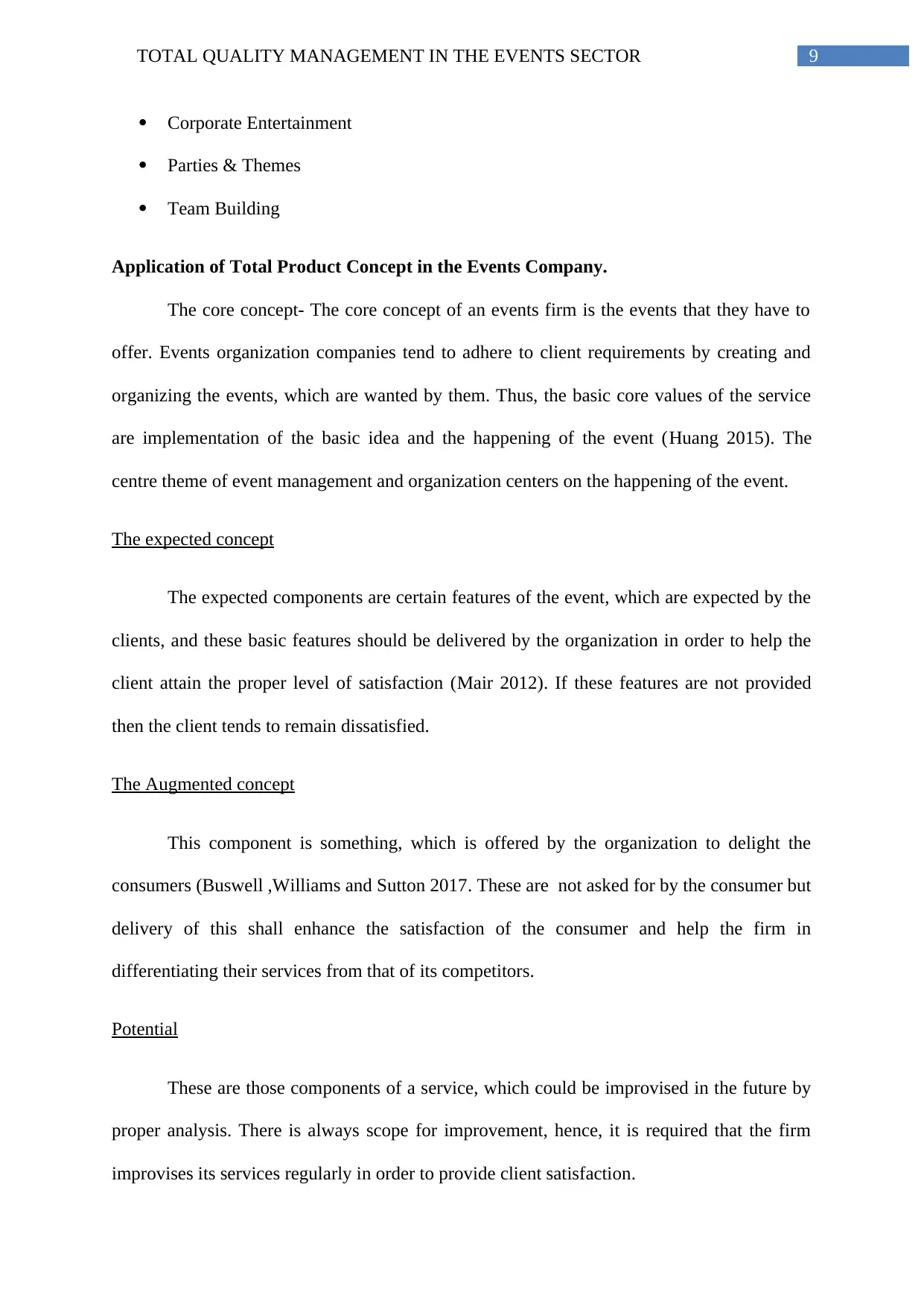
9TOTAL QUALITY MANAGEMENT IN THE EVENTS SECTOR
Corporate Entertainment
Parties & Themes
Team Building
Application of Total Product Concept in the Events Company.
The core concept- The core concept of an events firm is the events that they have to
offer. Events organization companies tend to adhere to client requirements by creating and
organizing the events, which are wanted by them. Thus, the basic core values of the service
are implementation of the basic idea and the happening of the event (Huang 2015). The
centre theme of event management and organization centers on the happening of the event.
The expected concept
The expected components are certain features of the event, which are expected by the
clients, and these basic features should be delivered by the organization in order to help the
client attain the proper level of satisfaction (Mair 2012). If these features are not provided
then the client tends to remain dissatisfied.
The Augmented concept
This component is something, which is offered by the organization to delight the
consumers (Buswell ,Williams and Sutton 2017. These are not asked for by the consumer but
delivery of this shall enhance the satisfaction of the consumer and help the firm in
differentiating their services from that of its competitors.
Potential
These are those components of a service, which could be improvised in the future by
proper analysis. There is always scope for improvement, hence, it is required that the firm
improvises its services regularly in order to provide client satisfaction.
Corporate Entertainment
Parties & Themes
Team Building
Application of Total Product Concept in the Events Company.
The core concept- The core concept of an events firm is the events that they have to
offer. Events organization companies tend to adhere to client requirements by creating and
organizing the events, which are wanted by them. Thus, the basic core values of the service
are implementation of the basic idea and the happening of the event (Huang 2015). The
centre theme of event management and organization centers on the happening of the event.
The expected concept
The expected components are certain features of the event, which are expected by the
clients, and these basic features should be delivered by the organization in order to help the
client attain the proper level of satisfaction (Mair 2012). If these features are not provided
then the client tends to remain dissatisfied.
The Augmented concept
This component is something, which is offered by the organization to delight the
consumers (Buswell ,Williams and Sutton 2017. These are not asked for by the consumer but
delivery of this shall enhance the satisfaction of the consumer and help the firm in
differentiating their services from that of its competitors.
Potential
These are those components of a service, which could be improvised in the future by
proper analysis. There is always scope for improvement, hence, it is required that the firm
improvises its services regularly in order to provide client satisfaction.
Secure Best Marks with AI Grader
Need help grading? Try our AI Grader for instant feedback on your assignments.
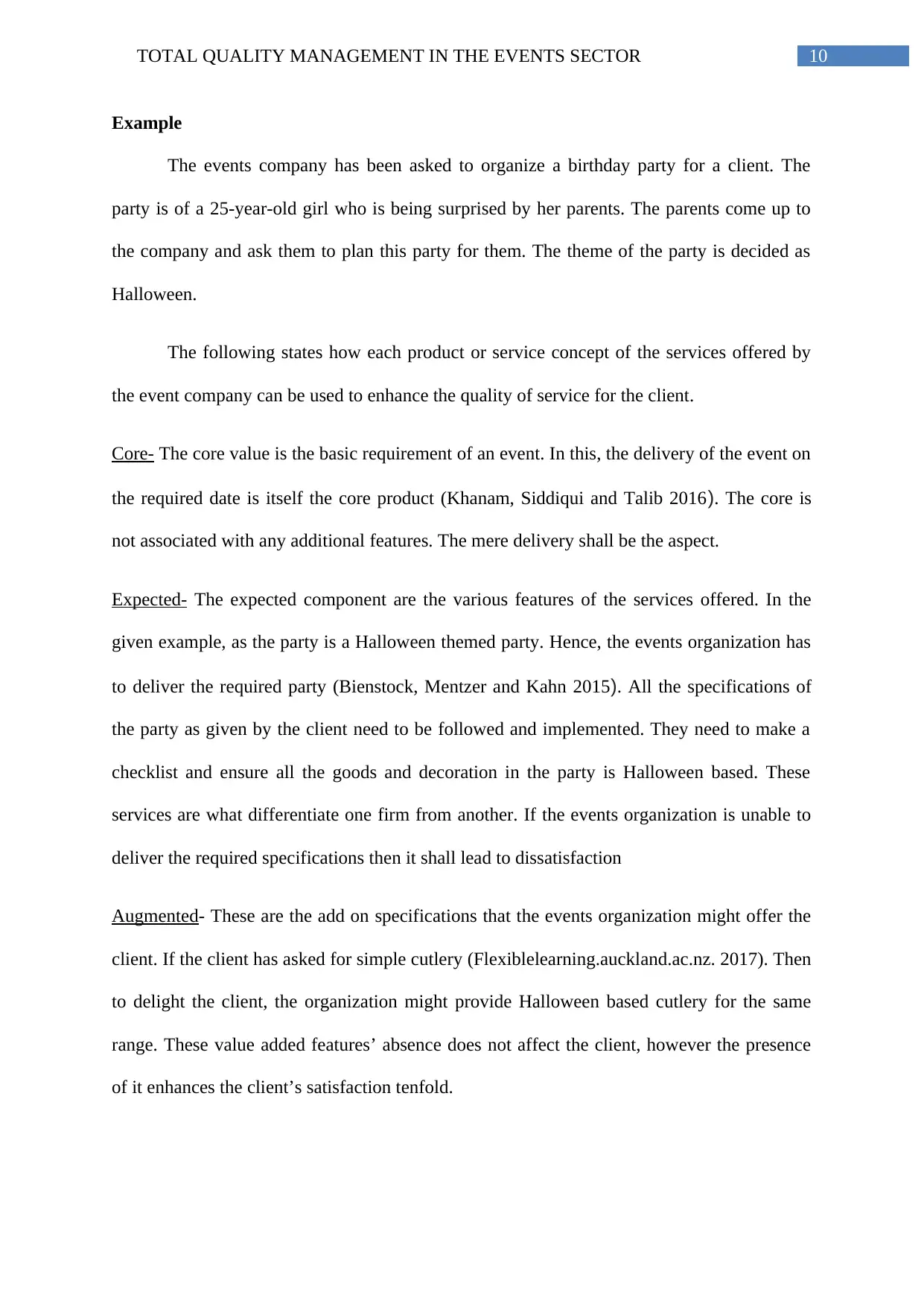
10TOTAL QUALITY MANAGEMENT IN THE EVENTS SECTOR
Example
The events company has been asked to organize a birthday party for a client. The
party is of a 25-year-old girl who is being surprised by her parents. The parents come up to
the company and ask them to plan this party for them. The theme of the party is decided as
Halloween.
The following states how each product or service concept of the services offered by
the event company can be used to enhance the quality of service for the client.
Core- The core value is the basic requirement of an event. In this, the delivery of the event on
the required date is itself the core product (Khanam, Siddiqui and Talib 2016). The core is
not associated with any additional features. The mere delivery shall be the aspect.
Expected- The expected component are the various features of the services offered. In the
given example, as the party is a Halloween themed party. Hence, the events organization has
to deliver the required party (Bienstock, Mentzer and Kahn 2015). All the specifications of
the party as given by the client need to be followed and implemented. They need to make a
checklist and ensure all the goods and decoration in the party is Halloween based. These
services are what differentiate one firm from another. If the events organization is unable to
deliver the required specifications then it shall lead to dissatisfaction
Augmented- These are the add on specifications that the events organization might offer the
client. If the client has asked for simple cutlery (Flexiblelearning.auckland.ac.nz. 2017). Then
to delight the client, the organization might provide Halloween based cutlery for the same
range. These value added features’ absence does not affect the client, however the presence
of it enhances the client’s satisfaction tenfold.
Example
The events company has been asked to organize a birthday party for a client. The
party is of a 25-year-old girl who is being surprised by her parents. The parents come up to
the company and ask them to plan this party for them. The theme of the party is decided as
Halloween.
The following states how each product or service concept of the services offered by
the event company can be used to enhance the quality of service for the client.
Core- The core value is the basic requirement of an event. In this, the delivery of the event on
the required date is itself the core product (Khanam, Siddiqui and Talib 2016). The core is
not associated with any additional features. The mere delivery shall be the aspect.
Expected- The expected component are the various features of the services offered. In the
given example, as the party is a Halloween themed party. Hence, the events organization has
to deliver the required party (Bienstock, Mentzer and Kahn 2015). All the specifications of
the party as given by the client need to be followed and implemented. They need to make a
checklist and ensure all the goods and decoration in the party is Halloween based. These
services are what differentiate one firm from another. If the events organization is unable to
deliver the required specifications then it shall lead to dissatisfaction
Augmented- These are the add on specifications that the events organization might offer the
client. If the client has asked for simple cutlery (Flexiblelearning.auckland.ac.nz. 2017). Then
to delight the client, the organization might provide Halloween based cutlery for the same
range. These value added features’ absence does not affect the client, however the presence
of it enhances the client’s satisfaction tenfold.
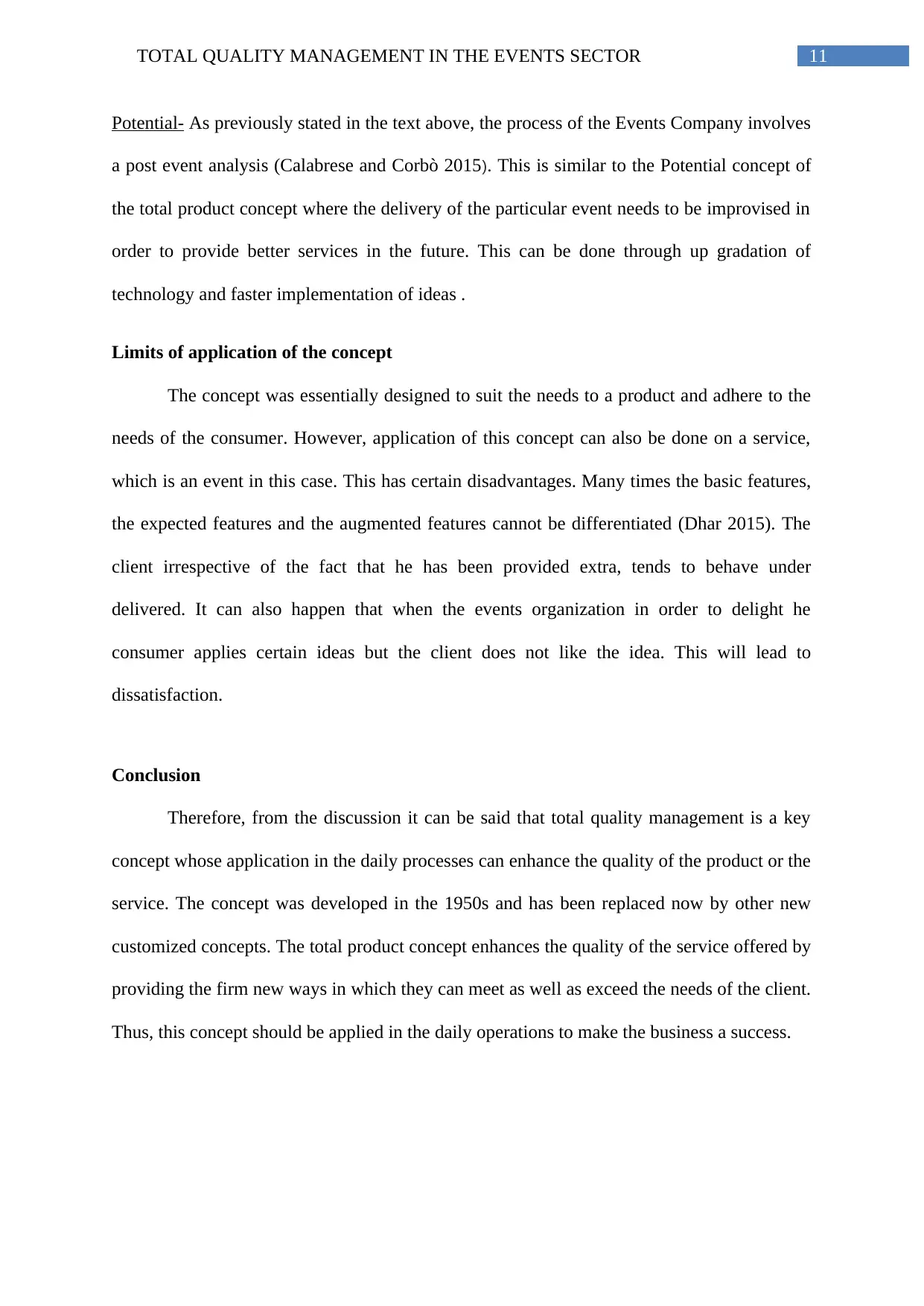
11TOTAL QUALITY MANAGEMENT IN THE EVENTS SECTOR
Potential- As previously stated in the text above, the process of the Events Company involves
a post event analysis (Calabrese and Corbò 2015). This is similar to the Potential concept of
the total product concept where the delivery of the particular event needs to be improvised in
order to provide better services in the future. This can be done through up gradation of
technology and faster implementation of ideas .
Limits of application of the concept
The concept was essentially designed to suit the needs to a product and adhere to the
needs of the consumer. However, application of this concept can also be done on a service,
which is an event in this case. This has certain disadvantages. Many times the basic features,
the expected features and the augmented features cannot be differentiated (Dhar 2015). The
client irrespective of the fact that he has been provided extra, tends to behave under
delivered. It can also happen that when the events organization in order to delight he
consumer applies certain ideas but the client does not like the idea. This will lead to
dissatisfaction.
Conclusion
Therefore, from the discussion it can be said that total quality management is a key
concept whose application in the daily processes can enhance the quality of the product or the
service. The concept was developed in the 1950s and has been replaced now by other new
customized concepts. The total product concept enhances the quality of the service offered by
providing the firm new ways in which they can meet as well as exceed the needs of the client.
Thus, this concept should be applied in the daily operations to make the business a success.
Potential- As previously stated in the text above, the process of the Events Company involves
a post event analysis (Calabrese and Corbò 2015). This is similar to the Potential concept of
the total product concept where the delivery of the particular event needs to be improvised in
order to provide better services in the future. This can be done through up gradation of
technology and faster implementation of ideas .
Limits of application of the concept
The concept was essentially designed to suit the needs to a product and adhere to the
needs of the consumer. However, application of this concept can also be done on a service,
which is an event in this case. This has certain disadvantages. Many times the basic features,
the expected features and the augmented features cannot be differentiated (Dhar 2015). The
client irrespective of the fact that he has been provided extra, tends to behave under
delivered. It can also happen that when the events organization in order to delight he
consumer applies certain ideas but the client does not like the idea. This will lead to
dissatisfaction.
Conclusion
Therefore, from the discussion it can be said that total quality management is a key
concept whose application in the daily processes can enhance the quality of the product or the
service. The concept was developed in the 1950s and has been replaced now by other new
customized concepts. The total product concept enhances the quality of the service offered by
providing the firm new ways in which they can meet as well as exceed the needs of the client.
Thus, this concept should be applied in the daily operations to make the business a success.
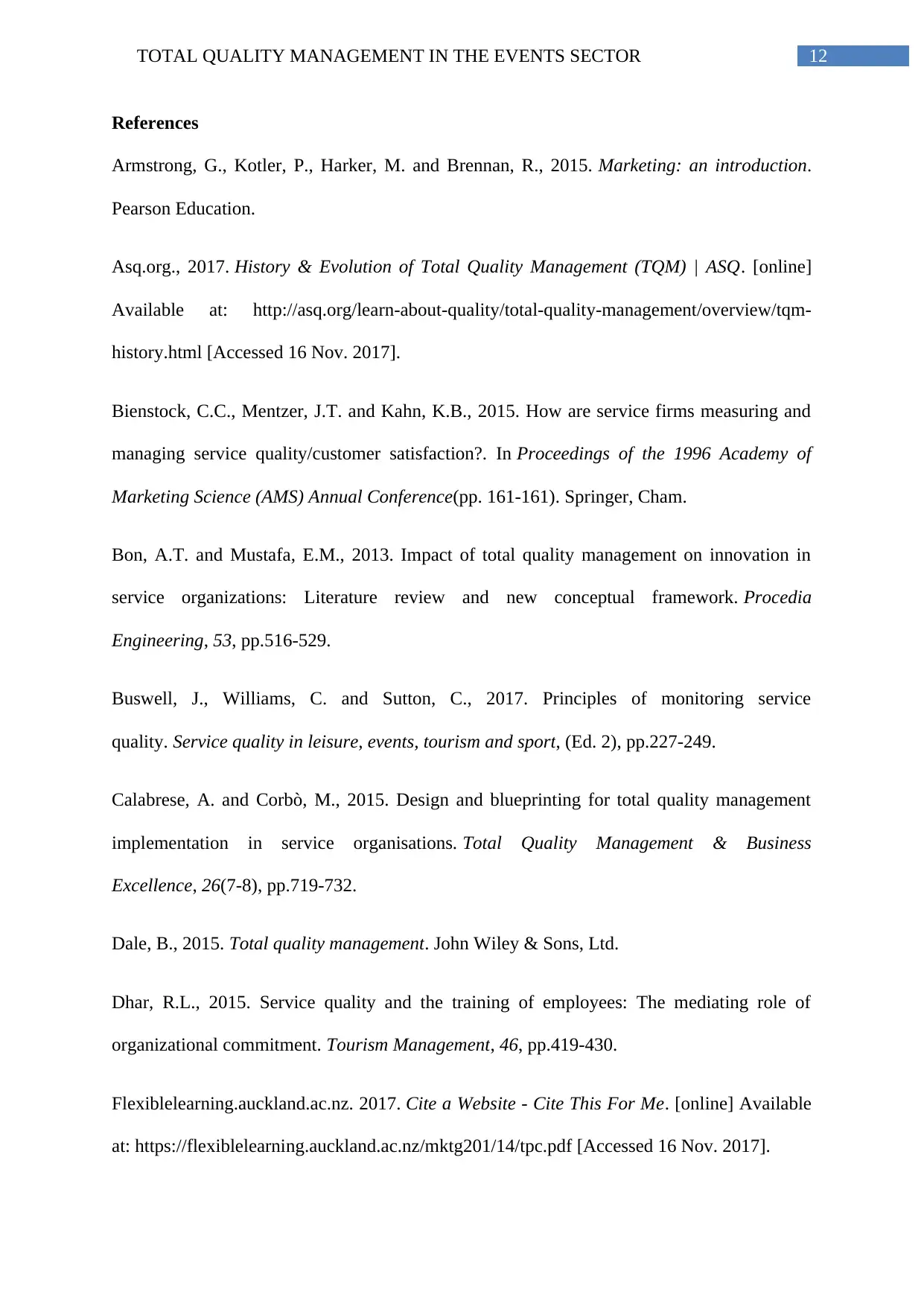
12TOTAL QUALITY MANAGEMENT IN THE EVENTS SECTOR
References
Armstrong, G., Kotler, P., Harker, M. and Brennan, R., 2015. Marketing: an introduction.
Pearson Education.
Asq.org., 2017. History & Evolution of Total Quality Management (TQM) | ASQ. [online]
Available at: http://asq.org/learn-about-quality/total-quality-management/overview/tqm-
history.html [Accessed 16 Nov. 2017].
Bienstock, C.C., Mentzer, J.T. and Kahn, K.B., 2015. How are service firms measuring and
managing service quality/customer satisfaction?. In Proceedings of the 1996 Academy of
Marketing Science (AMS) Annual Conference(pp. 161-161). Springer, Cham.
Bon, A.T. and Mustafa, E.M., 2013. Impact of total quality management on innovation in
service organizations: Literature review and new conceptual framework. Procedia
Engineering, 53, pp.516-529.
Buswell, J., Williams, C. and Sutton, C., 2017. Principles of monitoring service
quality. Service quality in leisure, events, tourism and sport, (Ed. 2), pp.227-249.
Calabrese, A. and Corbò, M., 2015. Design and blueprinting for total quality management
implementation in service organisations. Total Quality Management & Business
Excellence, 26(7-8), pp.719-732.
Dale, B., 2015. Total quality management. John Wiley & Sons, Ltd.
Dhar, R.L., 2015. Service quality and the training of employees: The mediating role of
organizational commitment. Tourism Management, 46, pp.419-430.
Flexiblelearning.auckland.ac.nz. 2017. Cite a Website - Cite This For Me. [online] Available
at: https://flexiblelearning.auckland.ac.nz/mktg201/14/tpc.pdf [Accessed 16 Nov. 2017].
References
Armstrong, G., Kotler, P., Harker, M. and Brennan, R., 2015. Marketing: an introduction.
Pearson Education.
Asq.org., 2017. History & Evolution of Total Quality Management (TQM) | ASQ. [online]
Available at: http://asq.org/learn-about-quality/total-quality-management/overview/tqm-
history.html [Accessed 16 Nov. 2017].
Bienstock, C.C., Mentzer, J.T. and Kahn, K.B., 2015. How are service firms measuring and
managing service quality/customer satisfaction?. In Proceedings of the 1996 Academy of
Marketing Science (AMS) Annual Conference(pp. 161-161). Springer, Cham.
Bon, A.T. and Mustafa, E.M., 2013. Impact of total quality management on innovation in
service organizations: Literature review and new conceptual framework. Procedia
Engineering, 53, pp.516-529.
Buswell, J., Williams, C. and Sutton, C., 2017. Principles of monitoring service
quality. Service quality in leisure, events, tourism and sport, (Ed. 2), pp.227-249.
Calabrese, A. and Corbò, M., 2015. Design and blueprinting for total quality management
implementation in service organisations. Total Quality Management & Business
Excellence, 26(7-8), pp.719-732.
Dale, B., 2015. Total quality management. John Wiley & Sons, Ltd.
Dhar, R.L., 2015. Service quality and the training of employees: The mediating role of
organizational commitment. Tourism Management, 46, pp.419-430.
Flexiblelearning.auckland.ac.nz. 2017. Cite a Website - Cite This For Me. [online] Available
at: https://flexiblelearning.auckland.ac.nz/mktg201/14/tpc.pdf [Accessed 16 Nov. 2017].
Paraphrase This Document
Need a fresh take? Get an instant paraphrase of this document with our AI Paraphraser
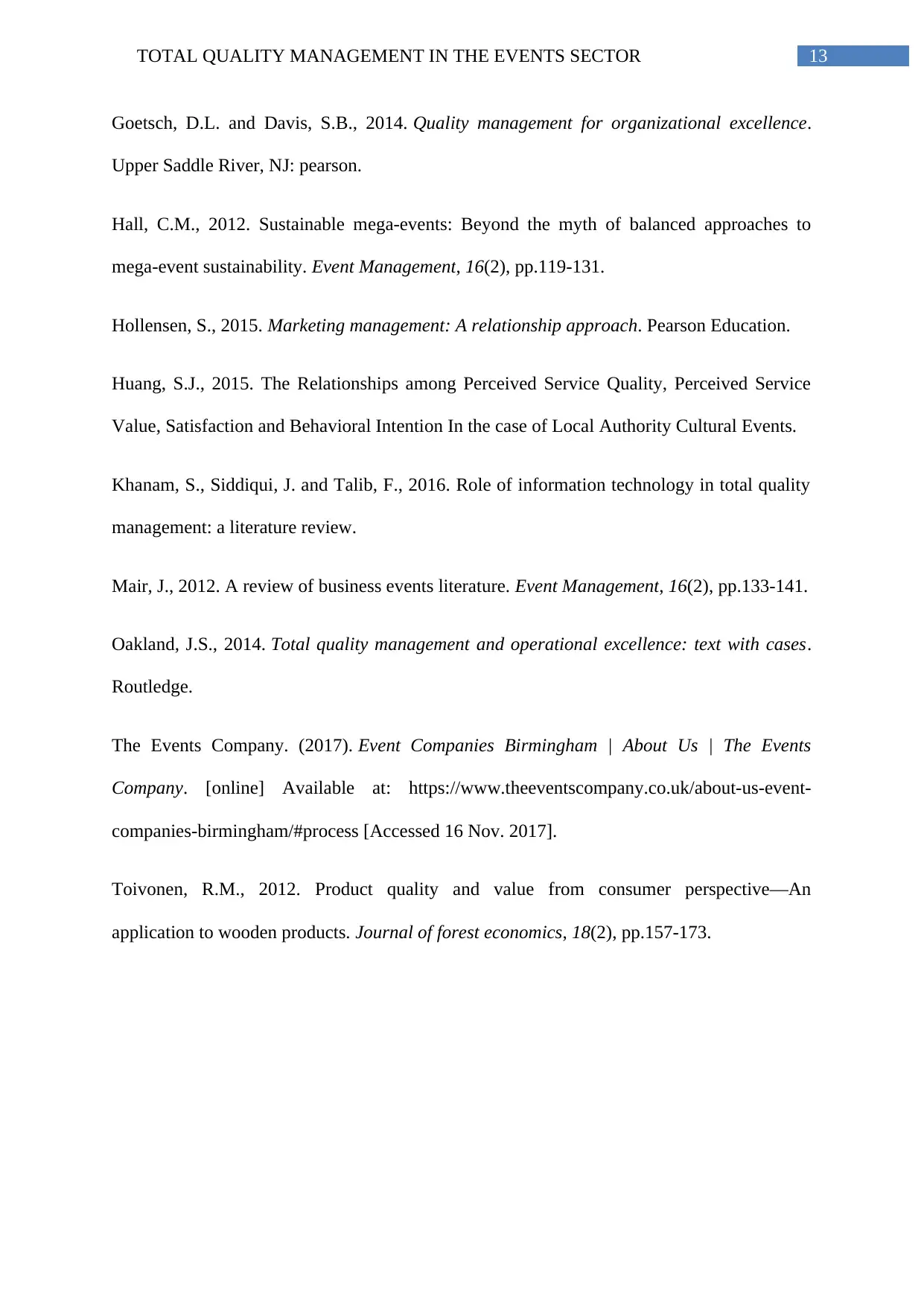
13TOTAL QUALITY MANAGEMENT IN THE EVENTS SECTOR
Goetsch, D.L. and Davis, S.B., 2014. Quality management for organizational excellence.
Upper Saddle River, NJ: pearson.
Hall, C.M., 2012. Sustainable mega-events: Beyond the myth of balanced approaches to
mega-event sustainability. Event Management, 16(2), pp.119-131.
Hollensen, S., 2015. Marketing management: A relationship approach. Pearson Education.
Huang, S.J., 2015. The Relationships among Perceived Service Quality, Perceived Service
Value, Satisfaction and Behavioral Intention In the case of Local Authority Cultural Events.
Khanam, S., Siddiqui, J. and Talib, F., 2016. Role of information technology in total quality
management: a literature review.
Mair, J., 2012. A review of business events literature. Event Management, 16(2), pp.133-141.
Oakland, J.S., 2014. Total quality management and operational excellence: text with cases.
Routledge.
The Events Company. (2017). Event Companies Birmingham | About Us | The Events
Company. [online] Available at: https://www.theeventscompany.co.uk/about-us-event-
companies-birmingham/#process [Accessed 16 Nov. 2017].
Toivonen, R.M., 2012. Product quality and value from consumer perspective—An
application to wooden products. Journal of forest economics, 18(2), pp.157-173.
Goetsch, D.L. and Davis, S.B., 2014. Quality management for organizational excellence.
Upper Saddle River, NJ: pearson.
Hall, C.M., 2012. Sustainable mega-events: Beyond the myth of balanced approaches to
mega-event sustainability. Event Management, 16(2), pp.119-131.
Hollensen, S., 2015. Marketing management: A relationship approach. Pearson Education.
Huang, S.J., 2015. The Relationships among Perceived Service Quality, Perceived Service
Value, Satisfaction and Behavioral Intention In the case of Local Authority Cultural Events.
Khanam, S., Siddiqui, J. and Talib, F., 2016. Role of information technology in total quality
management: a literature review.
Mair, J., 2012. A review of business events literature. Event Management, 16(2), pp.133-141.
Oakland, J.S., 2014. Total quality management and operational excellence: text with cases.
Routledge.
The Events Company. (2017). Event Companies Birmingham | About Us | The Events
Company. [online] Available at: https://www.theeventscompany.co.uk/about-us-event-
companies-birmingham/#process [Accessed 16 Nov. 2017].
Toivonen, R.M., 2012. Product quality and value from consumer perspective—An
application to wooden products. Journal of forest economics, 18(2), pp.157-173.
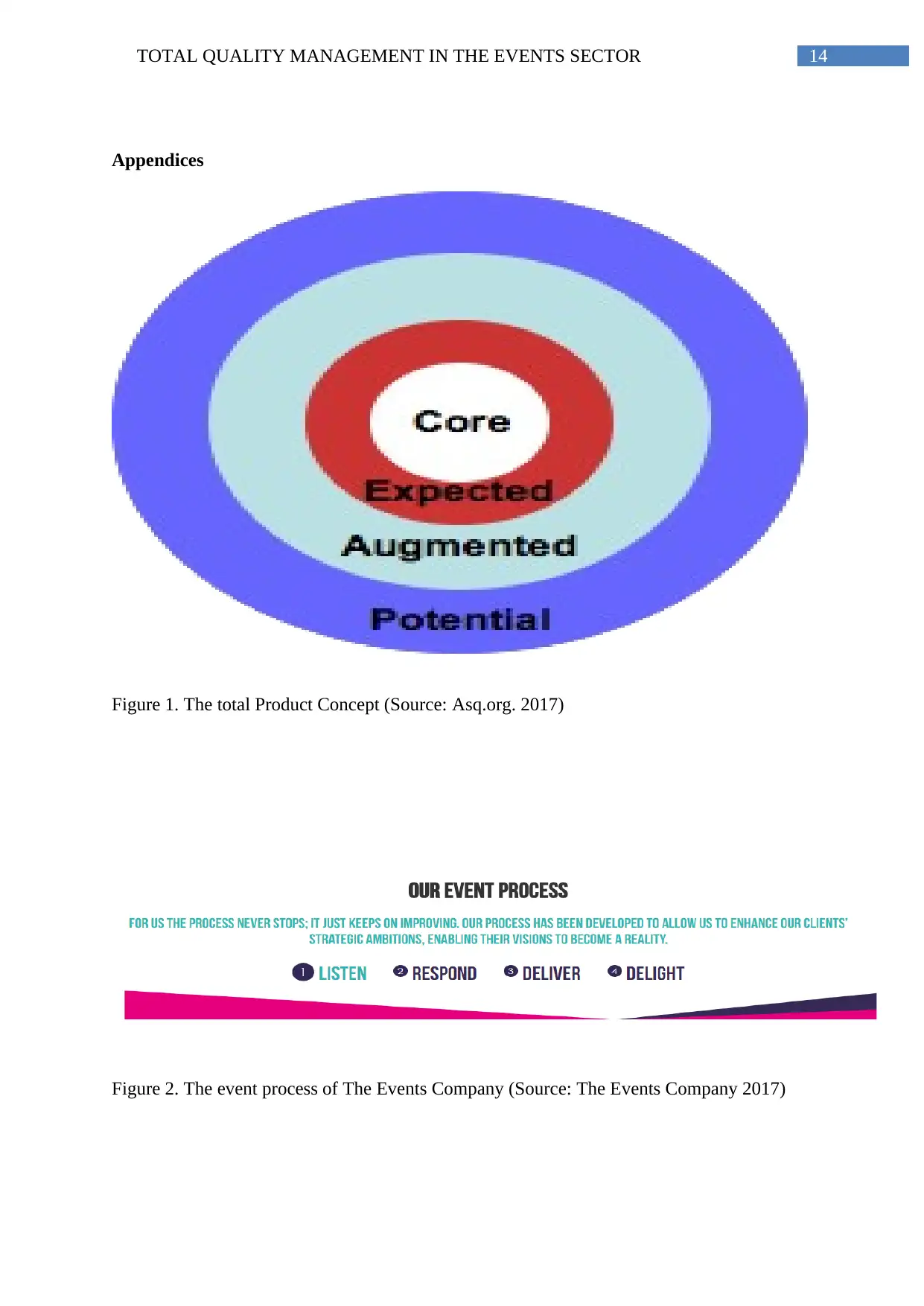
14TOTAL QUALITY MANAGEMENT IN THE EVENTS SECTOR
Appendices
Figure 1. The total Product Concept (Source: Asq.org. 2017)
Figure 2. The event process of The Events Company (Source: The Events Company 2017)
Appendices
Figure 1. The total Product Concept (Source: Asq.org. 2017)
Figure 2. The event process of The Events Company (Source: The Events Company 2017)
1 out of 15
Related Documents
Your All-in-One AI-Powered Toolkit for Academic Success.
+13062052269
info@desklib.com
Available 24*7 on WhatsApp / Email
![[object Object]](/_next/static/media/star-bottom.7253800d.svg)
Unlock your academic potential
© 2024 | Zucol Services PVT LTD | All rights reserved.





